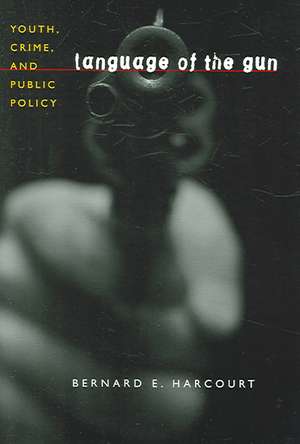Language of the Gun: Youth, Crime, and Public Policy
Autor Bernard E. Harcourten Limba Engleză Paperback – 9 feb 2006
Legal and public policies concerning youth gun violence tend to rely heavily on crime reports, survey data, and statistical methods. Rarely is attention given to the young voices belonging to those who carry high-powered semiautomatic handguns. In Language of the Gun, Bernard E. Harcourt recounts in-depth interviews with youths detained at an all-malecorrectional facility, exploring how they talk about guns and what meanings they ascribe to them in a broader attempt to understand some of the assumptions implicit in current handgun policies. In the process, Harcourt redraws the relationships among empirical research, law, and public policy.
Home to over 150 repeat offenders ranging in age from twelve to seventeen, the Catalina Mountain School is made up of a particular stratum of boys—those who have committed the most offenses but will still be released upon reaching adulthood. In an effort to understand the symbolic and emotional language of guns and gun carrying, Harcourt interviewed dozens of these incarcerated Catalina boys. What do these youths see in guns? What draws them to handguns? Why do some of them carry and others not? For Harcourt, their often surprising answers unveil many of the presuppositions that influence our laws and policies.
Home to over 150 repeat offenders ranging in age from twelve to seventeen, the Catalina Mountain School is made up of a particular stratum of boys—those who have committed the most offenses but will still be released upon reaching adulthood. In an effort to understand the symbolic and emotional language of guns and gun carrying, Harcourt interviewed dozens of these incarcerated Catalina boys. What do these youths see in guns? What draws them to handguns? Why do some of them carry and others not? For Harcourt, their often surprising answers unveil many of the presuppositions that influence our laws and policies.
Preț: 210.60 lei
Preț vechi: 250.58 lei
-16% Nou
Puncte Express: 316
Preț estimativ în valută:
40.30€ • 41.92$ • 33.27£
40.30€ • 41.92$ • 33.27£
Carte indisponibilă temporar
Doresc să fiu notificat când acest titlu va fi disponibil:
Se trimite...
Preluare comenzi: 021 569.72.76
Specificații
ISBN-13: 9780226316093
ISBN-10: 0226316092
Pagini: 264
Ilustrații: 3 halftones, 14 line drawings, 11 tables
Dimensiuni: 152 x 229 x 18 mm
Greutate: 0.4 kg
Editura: University of Chicago Press
Colecția University of Chicago Press
ISBN-10: 0226316092
Pagini: 264
Ilustrații: 3 halftones, 14 line drawings, 11 tables
Dimensiuni: 152 x 229 x 18 mm
Greutate: 0.4 kg
Editura: University of Chicago Press
Colecția University of Chicago Press
Notă biografică
Bernard E. Harcourt is professor of law at the University of Chicago. He is the author of Illusion of Order: The False Promise of Broken Windows Policing and the editor of Guns, Crime, and Punishment in America.
Cuprins
Preface
Part One. A Semiotic of the Gun
1. Catalina Mountain School, Tucson, Arizona
2. A Road Map of the Catalina Interviews
3. Symbolic Dimensions and Primary Meanings
4. Three Clusters of Primary Meanings
5. Placing the Clusters in Practice Contexts
6. The Sensual, Moral, and Political Dimensions of Guns
Part Two. Exploring Methodological Sensibilities
7. Sartre and the Phenomenological Gaze: Théâtre Antoine, Paris, April 2, 1948
8. Lévi-Strauss and the Structural Map: Paris, the Tropics, and the Untamed Mind
9. Bourdieu and Practice Theory: From the Kabyle House to the Street Corner
10. Butler and the Performative: From Identity and Scripts to the Discursive
11. Embracing the Paradigm of Dirty Hands
Part Three. Mapping Law and Public Policy
12. A Genealogy of the Youth Gun Field
13. The Landscape of Law and Public Policy
14. Leaps of Faith in Levitt and Bourgois
15. Making Ethical Choices in Law and Public Policy
Acknowledgments
Appendix: Treatment of Juvenile Records in State Sentencing
Notes
References
Index
Part One. A Semiotic of the Gun
1. Catalina Mountain School, Tucson, Arizona
2. A Road Map of the Catalina Interviews
3. Symbolic Dimensions and Primary Meanings
4. Three Clusters of Primary Meanings
5. Placing the Clusters in Practice Contexts
6. The Sensual, Moral, and Political Dimensions of Guns
Part Two. Exploring Methodological Sensibilities
7. Sartre and the Phenomenological Gaze: Théâtre Antoine, Paris, April 2, 1948
8. Lévi-Strauss and the Structural Map: Paris, the Tropics, and the Untamed Mind
9. Bourdieu and Practice Theory: From the Kabyle House to the Street Corner
10. Butler and the Performative: From Identity and Scripts to the Discursive
11. Embracing the Paradigm of Dirty Hands
Part Three. Mapping Law and Public Policy
12. A Genealogy of the Youth Gun Field
13. The Landscape of Law and Public Policy
14. Leaps of Faith in Levitt and Bourgois
15. Making Ethical Choices in Law and Public Policy
Acknowledgments
Appendix: Treatment of Juvenile Records in State Sentencing
Notes
References
Index
